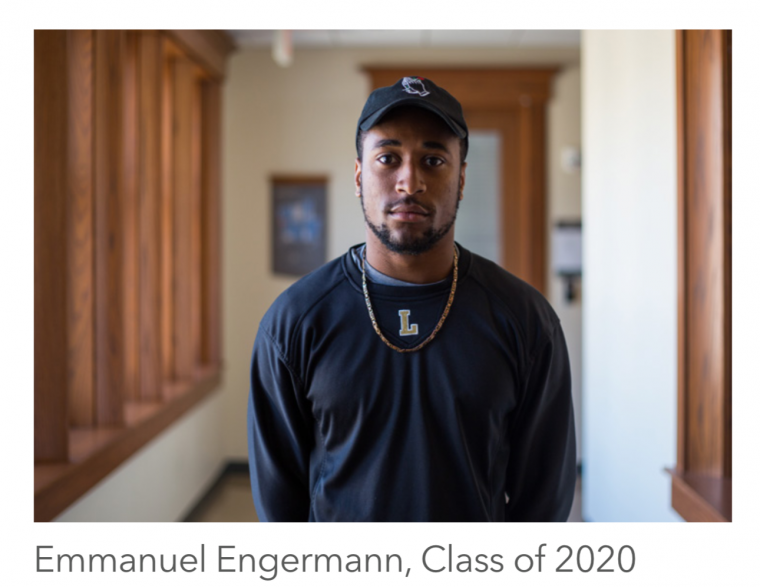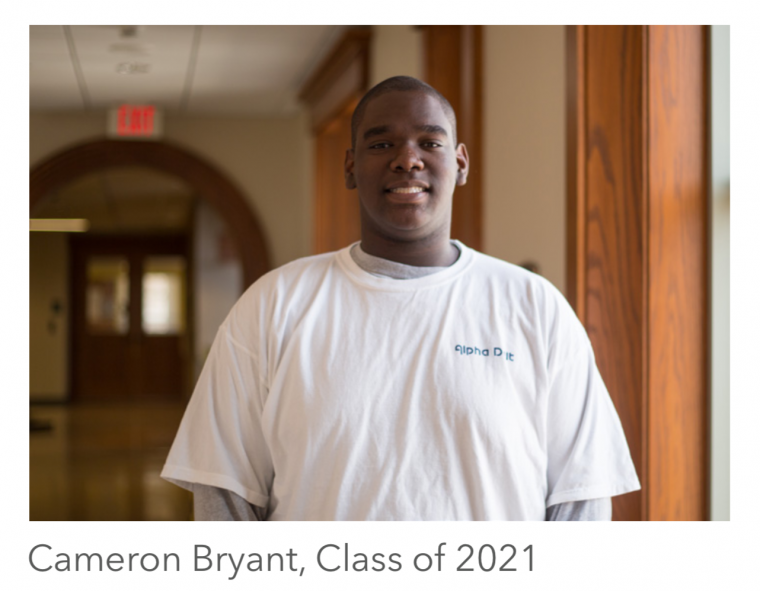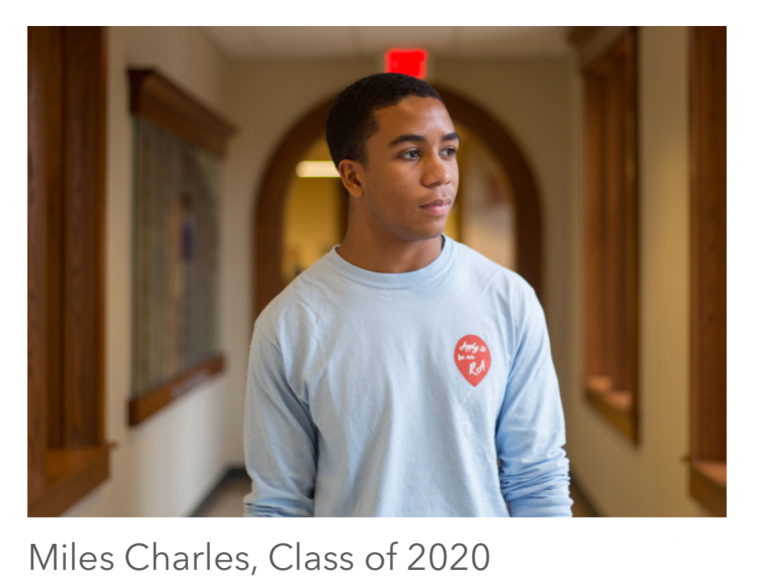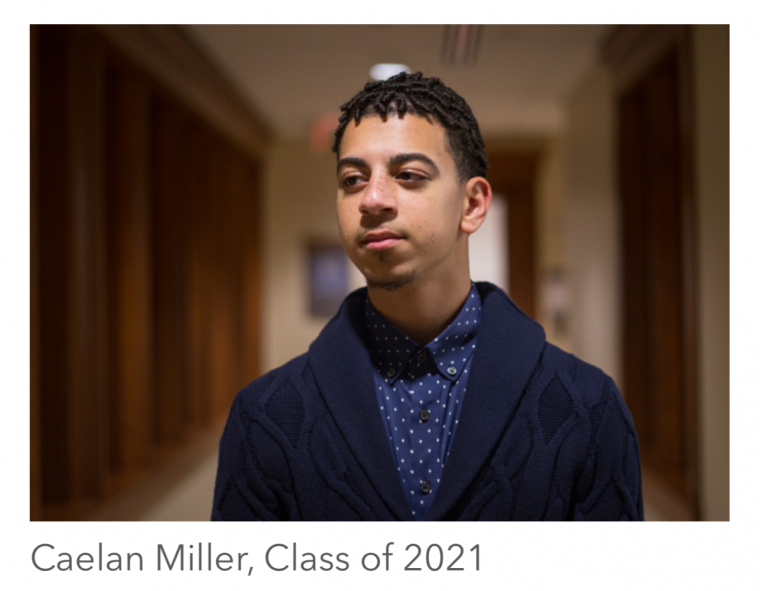WU: In Focus
Band of Brothers: Black men talk their experiences in WU’s white fraternities
Over the past few weeks, Student Life reporters Chalaun Lomax and Matthew Wallace sat down with several black members of Washington University’s historically white fraternities. The phrase “historically white” refers to on-campus fraternities represented in this story founded nationally in the mid- to late-1800s with a predominantly white membership. The on-campus chapters of these fraternities presently attract brothers from various racial and ethnic backgrounds.
We reached out to black members of on-campus fraternities and spoke with seven brothers from five fraternities, including Alpha Delta Phi, Sigma Nu, Kappa Sigma, Tau Kappa Epsilon and Sigma Chi. We expected to hear complicated narratives of reconciling one’s racial identity with the predominantly white Greek community at Washington University. What we found was an overwhelming sense of brotherhood and connection where race wasn’t a mitigating factor.
We recognize that short of interviewing every single black fraternity brother, this story cannot and will not fully encompass everyone’s experience. The goal of this story is to shed light on this aspect of the student experience that isn’t always discussed. We thank all of the brothers who agreed to speak with us for their honesty, candidness and willingness to share.
To some within the black community, joining a white fraternity can be considered taboo. The thought of willingly forming a brotherhood with white men, on top of attending a predominantly white institution is “paradoxical,” according to Emmanuel Engermann, a junior in Sigma Chi. Engermann hails from Baltimore, which happens to be the headquarters of two of America’s historically black fraternities, Alpha Phi Alpha Fraternity, Inc and Iota Phi Theta Fraternity, Inc.
Engermann didn’t envision himself joining a fraternity in college. Greek life’s negative association with drinking, partying and sexual violence turned Engermann away from the idea of exploring Greek life. The fact that both he and his two brothers, one of whom is also a member of Sigma Chi, are both in white fraternities surprises him.
“It’s a white fraternity, of course, so I kind of thought if I was going to rush, it was going to be a black fraternity or that I just wouldn’t rush at all. I never thought I’d be a part of Greek life in any way,” Engermann said.
Engermann’s decision to join the Tau Tau chapter of Sigma Chi was almost entirely driven by his friendships with members of the varsity football team, which he joined as an incoming freshman. As a member of the varsity team, Engermann arrived at the University earlier than most of his peers. His upperclassmen teammates served as his first introduction to Washington University and to Greek life.
“There was one dude in Sig Chi on the football team. He was a third string punter. And I was a freshman; so, I didn’t play that much. We talked a lot on the sidelines, and he introduced me to some dudes in the house, and I started going around there more during rush. That’s kind of how it happened…If he wasn’t on the team, I wouldn’t have known anyone in Sig Chi,” Engermann said.

His curiosity about Greek life was fostered by his teammates. He figured that if that he liked his teammates as individuals, he would probably like them as fraternity brothers, too. In addition, Engermann’s best friend from his hometown was going through the rush process at the same time and also ended up joining Sigma Chi.
“It was a pretty seamless transition, especially in the social scene,” Engermann said. “They were my closest friends on campus; so, it made sense to just be more involved in it afterwards.”
Engermann’s story rings true for many of the brothers we spoke to. It was the first meaningful interactions with other male students that often influenced their decision to join a white fraternity. The personal interactions with current fraternity brothers dispelled the negative stereotypes associated with fraternities. However, these stereotypes were a major concern for the brothers’ family members.
Reticence from family and friends regarding the decision to join Greek life is not an experience exclusive to black fraternity brothers. However, the taboo around black men joining white fraternities presents a unique challenge that these brothers were forced to navigate, despite their allegiance to their fraternities.
“I feel like more white students can just go into it and not think twice about it, whereas I have to think about how I’ll be viewed in the black community now,” sophomore Cameron Bryant said.
While all of the brothers received positive reactions from friends on campus for pledging, it was the conversations with friends and family back home that were a source of anxiety for some.
Bryant rushed Alpha Delta Phi in the spring of 2018 after his friends encouraged him to get involved. Bryant, who hails from Nashville, Tenn., didn’t think himself a future fraternity brother. Some of his hometown friends knew the exact fraternity they wanted to join in college. After encouragement from his friends on campus, Bryant attended his first few rush events and quickly connected with the brothers in Alpha Delta Phi.
“I was only planning to stay for 30 minutes, but I stayed for the full two hours,” Bryant said.
The subsequent pledge process provided additional opportunities to connect with his brothers and gain a better understanding of the fraternity’s values. What he values most is not simply the act of joining a fraternity, but the friendships that came from it.
“We are all in Alpha Delt, which is just the mechanism in which we met, but we can take this brotherhood somewhere else and be perfectly fine, too. It’s more about the friendships for me than anything,” Bryant said.
Making it official was an entirely different matter. After receiving a bid from Alpha Delta Phi, Bryant knew he had to tell his mother who held many reservations about fraternities writ large.
“It took me forever…to convince her, ‘Hey, this is not your average fraternity here,’” Bryant said.
As the deadline for bid acceptance quickly approached, Bryant had several long, hard-fought conversations with his mother to convince her that joining the fraternity would be a positive experience for him.

“I was waiting until an hour before bid acceptance for Alpha Delt talking to her. It was such a big thing. She made me call my godparents and talk to them because both of them are in Greek life. My godmother is a Delta [Sigma Theta], and my godfather is an Omega Psi Phi. [My mother] made me talk…and they were totally fine with it, but I was like ‘Michelle, it’s okay! [My godparents are] fine with it. You’re not even in Greek life. You should be fine with it.’ It was more like [my mother] didn’t want me to be the token black boy,” Bryant said.
Tokenization wasn’t a concern for Bryant at all. He had no intentions of downplaying his blackness in order to assimilate into his fraternity.
“They knew that from day one. I literally said that in a few of my rush conversations. I’m not going to compromise who I am for this fraternity. I’m going to be Cameron Michael Bryant until the day I die,” Bryant said.
But for Bryant, he must balance his pride in being a brother in Alpha Delt with the taboo of joining a white fraternity. While his mother was aware of his decision to rush, Cameron kept his extended family in the dark.
“I still haven’t told some of my family. They may see pictures I’m tagged in on Facebook, but I haven’t explicitly come out and said [anything]….I haven’t worn letters to Thanksgiving or anything. That’s going to be a big, big step. Because some of my family won’t get it. My motto is, ‘If you don’t pay my dues, then you can’t say anything to me,’” Bryant said.
Bryant’s mother is more accepting, and even purchased two Alpha Delta Phi t-shirts for her son over the summer. He’s worn his letters around the shop where she works as a beautician and thinks that some of her clients are aware that he rushed. During Thanksgiving break, he says he’ll take the step of wearing his letters home. Maybe.
At some point though, he’ll have to come clean. His brotherhood in Alpha Delt is too important to him to continue hiding it from the rest of his family.
“Some of my best friends are in Alpha Delt, people I want to be in my wedding. I’m so grateful for these friendships. They push me intellectually, which is what I also wanted, because there’s no point in being in something if it’s not going to stimulate you intellectually. They make me happy,” Bryant said.
The allegiance and dedication of Bryant speaks to the magnitude of what he feels for his fraternity brothers. If the connection was merely superficial, it’s hard to believe that Bryant would willingly face such tough conversations with his family and community when he goes back home.
Bryant’s story isn’t unique. For all of the brothers, their decision to rush a white fraternity was met with mixed responses from family and friends.
Engermann’s hometown friends initially teased him about his decision to rush Sigma Chi, and even jokingly renamed the fraternity “Sigma Chi Lattes.”
“I got roasted,” Engermann said. “Joining a white fraternity was taboo. I did not think about it for a reason. They’re more understanding now. The jokes won’t stop. That’s just how my boys are.”
For junior Miles Charles, a brother in Tau Kappa Epsilon, his parents’ hesitation was largely due to their limited exposure to Greek life and was compounded by negative stereotypes associated with fraternities.
“I come from a family where my parents went to a Christian college, [so] there was no Greek life,” Charles said. “They were definitely a little bit hesitant on it.”
Similarly, senior Jerry Abah’s parents who are both Nigerian immigrants, weren’t entirely convinced until they noticed the positive impact that Kappa Sigma had on their son.
“At first, they were really put off by it. They really didn’t want me to join. I didn’t tell them actually until I got…into Kappa Sigma that I was joining a fraternity. But after a year…they’re totally fine. They think it’s been helpful for me. They’ve seen how mature I’ve grown, how I’m more focused on class and my future,” Abah said.
Sophomore Caelan Miller, a brother in Tau Kappa Epsilon, says that his parents supported his involvement so long as Miller was willing to face the potential consequences of his decision.
“As for my parents, it wasn’t necessarily that they were unhappy,” Miller said. “They just did not think that it would suit me…given the reputation that fraternities do have.”
According to Miller, his parents told him that his TKE brothers, “are the people you have to be willing to be associate with. If you join this group of people you have to be ready for that accountability.”
For Miller, his prior relationships with brothers in TKE reinforced his decision to join. If he wanted to continue building those relationships, he felt joining the fraternity would be the best way to do so.
“I want to be cool with these people and if that means being in a fraternity and being a fellow brother in the bond as they say, I would be okay with that. I could justify that,” Miller said.
Some brothers expressed feeling disconnected with the black community on campus, in part because of their decision to rush a white fraternity. Others, like Bryant, don’t consider their involvement in a white fraternity as the cause of their distance from the black community. It predated their pledge process.

“If I’m being completely honest, I will say I feel a little bit less connected just because I do know even before I joined I know there a lot of people who don’t approve of black men joining white fraternities. But that being said, the people I was friends with before I joined are still friends with me now,” Charles said.
“I do feel like I’m part of the black community on campus. I’m not as engaged as I want to be, and one day I will get to that point,” Bryant said. “It will never be a barrier. I put time into something that I want to be a part of. If I see that adds value in my life, I’m going to keep going back, keep going back, keep going back. Some people may judge me for being in Alpha Delt, but we as people are way too critical of other people’s choices.”
Senior RJ Doro, a brother in Sigma Nu, recalled conversations with his mother who initially viewed Greek life as a distraction from his academics. “You’re here for school” is an all too common phrase that the brothers, including Doro, heard from family members. Doro’s mother was also deeply concerned by the negative image of fraternities in media and popular culture.
“My mom was never too supportive of it because she didn’t know exactly what it entailed and also because I’m pretty much one of the only ones in my family I think who is in a fraternity,” Doro said. “There’s always news reports and stuff just about all of the bad things fraternities are capable of doing and have happened in other fraternities across the country. Those are always going to be in the back of a mother’s mind.”
The reaction of family and friends sometimes contrasts with the brothers’ sense of connection and belonging to their fraternities and demonstrates the challenge of balancing one’s commitment to their fraternity with their commitment to their families and friends. Whether through jokes from friends, serious tensions with family members, or disconnection with the black community on campus, all brothers understand that their individual decision to join a fraternity had broad social impact in their personal lives.
The rush process provided the brothers with their first formal introduction to the University’s fraternities. Prior to formally engaging in the process, recommendations with friends and personal interactions with other brothers allowed the brothers to make initial assumptions about which fraternities would best suit them. In other words, the rush process merely confirmed what they already knew beforehand.
The power of personal connections to Greek life was a strong influence for all of the brothers we interviewed. Many brothers praised the culture of the University, which makes it easier for a student of color to join a predominately white fraternity.
“In my opinion, a lot of Wash. U. fraternities in general do not fit the stereotype of the general, whatever fraternities you see on the news or in movies. Just because of the culture of the school,” Doro said.
“I think at Wash. U. in total the campus is just a lot more socially-aware and accepting than most other campuses, of course. With that, it makes it a lot easier for a minority student to join a white organization, even though most of the dudes in the house are still obviously white,” Engermann said.
Attending Sigma Chi’s international conference helped provide Engermann with perspective on how Washington University’s Tau Tau chapter compares with other national chapters. In Engermann’s view, his chapter does a great job focusing on diversity and inclusion, but he recognized that there is certainly room for improvement.
“I went to our international fraternity conference the past two years, and Sig Chi is very different internationally. We clearly brought the most black kids—six black kids to the conference with us. There was like six others in total [out of ] 1,000 other people there. It’s a totally different vibe,” Engermann said.
Bryant recalled conversations with an upperclassman in Alpha Delta Phi concerning how the fraternity handles issues related to race. He was reassured, by actions such as censoring music played at parties, that the fraternity was focused on addressing these issues in a more meaningful way. The fraternity, according to Bryant, is becoming increasingly racially diverse. While only two founding members in the Eliot Chapter of Alpha Delta Phi were black, according to Bryant, the fraternity is becoming increasingly racially diverse.
“We are slowly becoming more diverse. Currently, there are I would say 10 or so people of color in the fraternity but…I never feel like a minority,” Bryant said. “They’re always aware that other people have different experiences and not everybody is a white male here.”
The internal culture of Alpha Delta Phi dispelled the negative stereotypes that Bryant previously associated with Greek life.
“Personally, when I thought of fraternities, I thought, ‘Oh, there might be a rape culture that I don’t want be a part of. There might be a heavy drinking culture that I don’t want to be a part of—homophobia and all the things [of the nature].’ But that’s not what Alpha Delt is, at all,” Bryant said.
For sophomore Anthony Williams, a brother in Sigma Chi, the history of white fraternities can be difficult to reconcile with, but it constitutes a small fraction of his Greek life experience.
“I want to emphasize that it’s very much about the chapter. National Sig Chi, I don’t agree with. I don’t agree with them at all. The founders, we have seven founders, one of them is a confederate. He’s known for his fidelity, yet his fidelity is to the confederacy. Having that cognitive dissonance there is kind of rough sometimes but the chapter makes up for it,” Williams said.
For Doro, the culture of Sigma Nu has allowed the fraternity to bring together individuals of various geographic, ethnic and ideological backgrounds. He characterized the fraternity’s culture as down-to-earth and accepting of others.
“I want to be…in a place where we don’t judge other people for not being in a fraternity, judge other people for looking a certain way or doing something different from anybody else and just kind of respecting everyone. That’s what I got from Sig Nu, and that’s why I picked it in the end,” Doro said.

Miller noted the importance of mentorship as one of the reasons he joined TKE. For him, Greek life presented an opportunity for community building.
“I do think people should really look to Greek life as not necessarily a group for people are lazy and alcoholics and drug abusers but more so a community of people who want to come together and support each other. That’s the vibe I’ve gotten from TKE.” Miller said.
“We don’t just talk the talk, we actually strive to walk the walk. Like I said, many different times it’s that sort of accountability. I really feel like we take mentorship at its core [seriously].”
While the role of personal connections to Greek life is apparent and relevant for all brothers, several expressed that they would not have rushed if not at Washington University.
“Those same stigmas…at a lot of other schools are true. Even at this conference, there were thousands of other Sig Chi dudes there. I could count the number of black dudes on two hands. Maybe three,” Engermann said. “It was very off-putting, not going to lie. If I wasn’t at Wash. U., I probably wouldn’t have rushed. Straight up.”
While race may have influenced friends and family members’ response to the decision to rush a white fraternity, the brothers themselves felt that their racial identity did not impact experience in their respective fraternities.
“They see me, and they don’t see color. They don’t see my skin tone. At the end of the day, they see me as Cameron Bryant, the person, instead of Cameron Bryant, the large black man.” Bryant said.
For Abah, his fraternity has provided him with both emotional and social support.
“It has helped improve my self-confidence because when I’m bummed out, they’ll cheer me up. They’ll talk with me through my problems. It’s a lot of just self-esteem, self-worth that it’s helped. In other ways I can say, I feel more comfortable being myself than I’m used to,” Abah said. “I’m able to freely express myself without being judged.”
For Charles, his position as social justice chair in Tau Kappa Epsilon has had more of an influence on his experience as a fraternity brother, especially concerning discussions on race and social issues.
“I’d say there’ve been just like a couple of incidents where I do find myself having to explain something to an individual, just being like, “You have to look at this through a different perspective to get an understanding,” but on a larger scale, there hasn’t been much of an impact,” Charles said.
All of the brothers interviewed felt that they were able to find community, brotherhood and a sense of belonging as a result of their engagement in the University’s fraternities. They also noted the ways in which Greek life has enhanced their college experience. From preparing them for leadership roles on campus, to increasing their academic focus and time management skills, to diversifying their friend groups, all of the brothers felt that their rushing fraternities was beneficial in more ways than one.
Engermann and Abah encourage other black men looking for another form of social engagement to not be deterred by the stigma surrounding black men joining white fraternities.
“Being a black student in a white fraternity may have its stigmas outside of Wash. U. but I think…the culture here has made it very easy to assimilate into this white fraternity [and] white system,” Engermann said. “I’ve had a great time and because I’ve had a great time I want to encourage other black students to be a part of it.”
“If you have something that’s not diverse, and you look at it and say ‘I’m not joining because it’s not diverse,’ then how is that thing ever going to be diverse?’” Abah said.
Miller encourages people to be openminded but to recognize that it is important for both current and prospective brothers to uphold the values of a fraternity. Greek life, he says, isn’t for everyone.
“I would say go for it, but also know what you’re getting yourself into. Because it’s easy for people to claim brotherhood and all of these values on the outside when in reality, once you become a brother, it’s like ‘oh, that’s not how it was when I rushed,’” Miller said. “You have to be really generally okay with the idea of being in any sort of Greek life.”
Charles acknowledges that involvement in Greek life is one of the best ways to address issues within the Greek community.
“My experience with TKE has been positive, but I think with Greek life, in general, it’s like everybody knows that it’s a system that has a lot of issues that needs to be addressed. I think, for me, it’s important that there are people who are willing to get involved and…do work on the ground to help improve those systems,” Charles said. “I think it’s an opportunity to get involved and make a difference.”
Additional reporting by Matthew Wallace
In part two of “Band of Brothers,” we’ll explore why the brothers we interviewed chose not to join black fraternities, the cultural differences between black and white fraternities, and the relationship between Washington University and St. Louis’ city-wide chapters of historically black fraternities.
